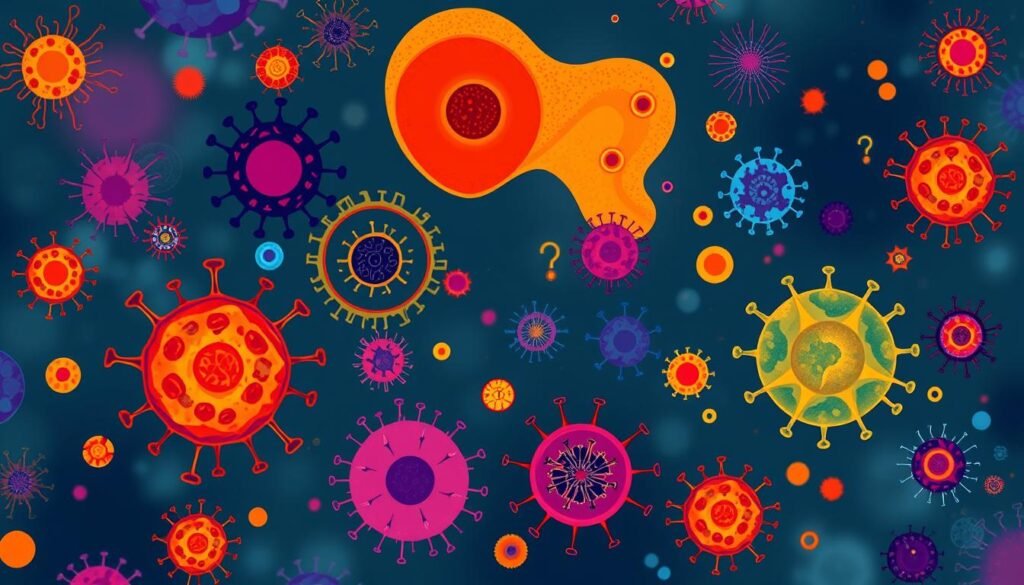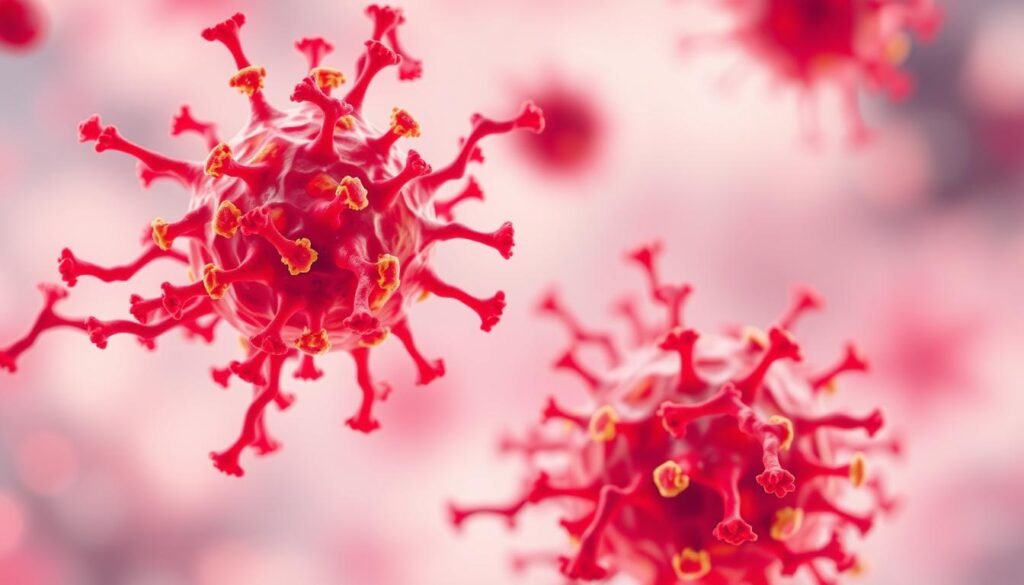Nearly 70% of women with Polycystic Ovary Syndrome (PCOS) face chronic inflammation. This fact highlights how big of an impact chronic inflammation has on PCOS. With issues like irregular periods, insulin problems, and obesity, managing inflammation is key.
Understanding how chronic inflammation and PCOS are connected helps in handling the condition better. It shows why it’s vital to tackle this hidden issue for better health. And chronic inflammation plays a significant role in PCOS behind the scenes. For more insights, research shows that high levels of inflammatory markers greatly affect those with PCOS.
Key Takeaways
- The majority of women with PCOS show signs of chronic inflammation.
- Chronic inflammation can worsen PCOS symptoms like insulin resistance.
- It is important to understand inflammation’s role for effective PCOS management.
- Women with PCOS often have high inflammatory markers.
- Focusing on chronic inflammation can lead to better reproductive health.
Understanding Chronic Inflammation
Chronic inflammation is a continuous immune response that can hurt tissues and organs over time. It’s different from acute inflammation, which is the body’s short-term defense against harm. We’ll explore what chronic inflammation is, its main features, and how it’s different from its acute counterpart.
What is Chronic Inflammation?
Chronic inflammation lasts for a long time. It can be due to long-lasting infections, autoimmune diseases, or exposure to irritants. For those with PCOS, it can make symptoms worse and cause more health issues. Let’s look at its key features:
- Persistent inflammatory cell presence: Chronic inflammation means immune cells like macrophages and lymphocytes are always there.
- Continuous tissue damage: Long exposure to inflammatory substances can harm tissue structure. This might make PCOS symptoms more severe.
- Proliferation of blood vessels: This could also lead to more tissue damage and impact hormonal balance.
Differences Between Acute and Chronic Inflammation
Knowing how acute and chronic inflammation differ is crucial. Below is a summary of their main differences:
| Aspect | Acute Inflammation | Chronic Inflammation |
|---|---|---|
| Duration | Short-term (days to weeks) | Long-term (months to years) |
| Causes | Injury, infection | Persistent infection, autoimmune disorders |
| Cell Types Involved | Neutrophils | Macrophages, lymphocytes |
| Tissue Effect | Minimal and reparative | Continuous damage and remodeling |
| Symptoms | Localized and often severe | Ongoing discomfort or symptomatic effects, including aggravation of PCOS symptoms |
The Role Chronic Inflammation in PCOS
Chronic inflammation has a big role in how hormones interact in the body. It messes with the balance needed for ovaries to work right. Knowing how inflammation changes hormone actions helps us understand PCOS better.
How Inflammation Interacts with Hormones
In PCOS, inflammation and hormones affect each other a lot. Things like cytokines can mess up how hormones signal. High cytokine levels can cause insulin resistance. This messes up insulin, impacting sex hormones like testosterone.
These changes can lead to irregular periods, which are common in PCOS.
Impact of Inflammation on Ovarian Function
Ovarian function gets hit hard by chronic inflammation. It can stop normal ovulation. Inflammation changes the ovaries’ environment, hurting follicle growth.
This can lead to anovulation, where ovulation doesn’t happen. So, many face PCOS symptoms like missed periods and fertility challenges. It shows how important it is to tackle these inflammation issues.
Chronic Low-Grade Inflammation Explained
Chronic low-grade inflammation is a mild, ongoing form that interests many due to its ties to health issues, like PCOS. It’s crucial to grasp this condition to better understand the health problems it can cause or worsen.
Definition and Characteristics
It’s marked by long-term, slightly elevated inflammatory markers in the blood. Unlike the acute kind, which happens due to injury or infection, this inflammation stays over time without clear symptoms. This unnoticed condition plays a big role in obesity and metabolic disorders.
Causes of Chronic Low-Grade Inflammation
Various factors lead to chronic inflammation, especially in women with PCOS. Key contributors include:
- Obesity: Extra body fat boosts inflammation, forming a harmful loop.
- Poor dietary choices: Eating lots of processed foods, sugars, and bad fats increases inflammation.
- Physical inactivity: Not moving much can heighten inflammation risks.
- Genetic predispositions: Some people’s genes make them more prone to inflammation, impacting PCOS and obesity-related inflammation.
Understanding these causes aids in creating strategies to control chronic inflammation. This can improve health and wellness.
Inflammatory Markers in PCOS
Polycystic ovary syndrome (PCOS) is closely linked with inflammation. Inflammatory markers help us understand issues in women’s health. They show inflammation in the body and shed light on PCOS symptoms. Knowing about these markers makes treatment better.
Common Inflammatory Markers Identified
Several inflammatory markers are key in PCOS. Important ones are:
- C-reactive protein (CRP)
- Interleukin-6 (IL-6)
- Tumor necrosis factor-alpha (TNF-alpha)
High levels of these markers suggest ongoing inflammation. PCOS is often marked by more CRP and IL-6. This points to a connection with obesity and insulin issues. Identifying them helps understand and manage PCOS.
Link Between Inflammatory Markers and PCOS Symptoms
Research links high inflammatory markers to worse PCOS symptoms. These include PCOS symptoms like irregular periods and weight gain. These challenges affect quality of life deeply. Also, studies explore how these markers signal changes and treatment opportunities. For more, see this study.

Knowing how these markers interact with PCOS is crucial. It leads to treating PCOS more holistically. It’s all about reducing inflammation to improve PCOS symptoms.
Insulin Resistance and Inflammation
Insulin resistance is a problem many women with PCOS face. Their body’s cells don’t react properly to insulin. This can cause higher insulin levels and lead to issues like weight gain and high blood sugar. It’s very important to understand insulin resistance to manage PCOS symptoms since it’s closely linked to inflammation.
Understanding Insulin Resistance
Insulin is key for controlling blood sugar by helping glucose enter the body’s cells. If you’re insulin resistant, your body makes more insulin. This can cause long-term inflammation, which is bad for women with PCOS. Studies show managing the link between insulin and inflammation is critical for handling the condition.
The Bidirectional Relationship Between Insulin and Inflammation
The connection between insulin resistance and inflammation goes both ways. High insulin levels can lead to more inflammation. In turn, inflammation makes insulin resistance worse. This cycle is harmful for those with PCOS, causing many health problems. Managing these issues involves lifestyle changes. This includes a better diet, regular exercise, and stress reduction. Knowing the role of chronic inflammation in PCOS is key for effective treatments. It is crucial to focus on both insulin resistance and inflammation to enhance the quality of life.
Oxidative Stress and PCOS
Oxidative stress comes from a balance issue between free radicals and antioxidants. It’s linked to many health problems, including chronic inflammation. For women with PCOS, it’s important to understand oxidative stress. This knowledge helps in handling their reproductive health better.
Definition of Oxidative Stress
Oxidative stress happens when free radical production is too high. The body struggles to counteract this with antioxidants. This imbalance harms our cells and can cause inflammation. For those with PCOS, oxidative stress makes their hormonal imbalances worse.
Effects of Oxidative Stress on Reproductive Health
Oxidative stress affects reproductive health a lot. It can mess with hormonal balance, which is crucial for ovulation and fertility. In PCOS patients, oxidative stress makes symptoms worse by adding to inflammation. This hurts ovarian function. So, tackling oxidative stress helps improve reproductive health in PCOS cases.

Anti-Inflammatory Diet for PCOS
An effective anti-inflammatory diet for PCOS can significantly improve symptoms and overall health. This diet includes certain foods that fight inflammation and help balance hormones. Making smart food choices is a key step in controlling PCOS.
Key Food Groups to Include
Choosing the right foods is vital to lessen inflammation. Here are the top picks:
- Fruits: Berries, oranges, and apples are rich in antioxidants.
- Vegetables: Spinach and kale are great for their vitamins.
- Whole Grains: Foods like quinoa and oats are full of fiber.
- Healthy Fats: Olive oil, avocados, and nuts support health.
- Lean Proteins: Options include fish, poultry, and beans.
Adding these foods to your diet can ease PCOS symptoms and improve health. Find more diet tips here.
Foods to Avoid to Reduce Inflammation
Some foods can make inflammation and PCOS symptoms worse. Try to limit or avoid these:
- Processed foods, which are loaded with bad fats and sugars.
- Refined carbohydrates, they cause quick rises in blood sugar.
- Added sugars in soft drinks and sweets boost insulin levels.
- Saturated fats in red meat and full-fat dairy.
- Fried foods, they can increase inflammation.
Knowing which foods to avoid is key for managing PCOS. Wise food choices can lower inflammation and boost your health.
Inflammatory Cytokines in PCOS
Inflammatory cytokines are key players in PCOS. They are proteins made by your immune cells. These proteins play a big role in many body processes. In PCOS, cytokines like IL-6 and TNF-alpha are linked to ongoing inflammation. It’s important to know how these cytokines work to understand their effect on PCOS.
Understanding Cytokines and Their Role
Cytokines help cells talk to each other. They manage how your body responds to stress and infection. In PCOS, too many inflammatory cytokines can mess up hormone levels. This can cause symptoms like uneven periods, gaining weight, and skin problems. Too many cytokines mean constant low-grade inflammation, a common issue in PCOS.
Effects of Cytokines on Metabolic Health
Cytokines affect more than just reproductive health. In PCOS, they can make insulin resistance worse. Insulin resistance is a key issue in PCOS. Cytokines also increase obesity risk and heart disease factors. This bad cycle means more inflammation and metabolic problems. Targeting these cytokines could be a new way to treat PCOS.

| Cytokine | Role in PCOS | Impact on Metabolic Health |
|---|---|---|
| IL-6 | Promotes inflammation and insulin resistance | Linked to obesity and increased cardiovascular risk |
| TNF-alpha | Increases insulin resistance; can affect ovarian function | Contributes to metabolic abnormalities and fat accumulation |
| IL-1β | Stimulates inflammatory process; may disrupt hormonal balance | Associated with metabolic disturbances |
Chronic Inflammation and Fertility
Chronic inflammation is a big hurdle for reproductive health, especially for women with PCOS. It’s vital to know how this affects fertility. This condition can change hormone levels, which might lead to less frequent ovulation and lower fertility chances. Looking into how it affects ovulation can help us find ways to improve fertility.
Impact of Inflammation on Ovulation
Inflammation’s effect on fertility is complex. During inflammation, certain chemicals called cytokines can mess with how the ovaries work. This makes ovulating harder, which can make it tough to get pregnant. Women with ongoing inflammation often see changes in their periods, making it even more challenging to conceive. Inflammation can make the body less welcoming for ovulation and for a baby to implant.
Potential Fertility Treatments Addressing Inflammation
Tackling chronic inflammation could lead to better fertility. There are various treatments aimed at reducing inflammation. These treatments include:
- Medicines like anti-inflammatories and corticosteroids that directly fight inflammation.
- Making changes in your life, such as exercising regularly and managing stress, which can help reduce inflammation naturally.
- Choosing a diet rich in anti-inflammatory foods can help balance hormones better.
Using a mix of these strategies, women dealing with chronic inflammation can have a better chance at starting a family.
Conclusion
Chronic inflammation plays a big role in PCOS, affecting hormonal balance and ovarian function. It’s important, not minor. Knowing this helps people manage PCOS symptoms better.
Changing what you eat to an anti-inflammatory diet helps a lot. This means eating foods full of antioxidants, healthy fats, and fiber. These changes can cut down on PCOS inflammation. Learning about inflammatory markers and cytokines also offers more understanding.
More research on PCOS and inflammation is needed. This understanding can lead to better treatments. If we keep focusing on inflammation management, reproductive health can improve. This means better health overall for those with PCOS.